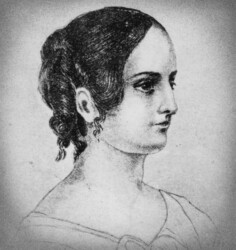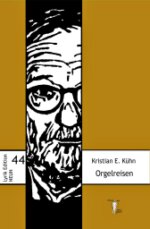Acton Bell (alias Anne Brontë): Vanitas vanitatum, omnia vanitas
Gedichte > Klassiker

Acton Bell / Anne Brontë
übertragen von Anne Bennet
VANITAS VANITATUM, OMNIA VANITAS.
In all we do, and hear, and see,
Is restless Toil and Vanity.
While yet the rolling earth abides,
Men come and go like Ocean tides;
And ere one generation dies,
Another in its place shall rise;
That, sinking soon into the grave,
Others succeed, like wave on wave;
And as they rise, they pass away.
The sun arises every day,
And, hastening onward to the West,
He nightly sinks, but not to rest:
Returning to the eastern skies,
Again to light us, he must rise.
And still the restless wind comes forth,
Now blowing keenly from the North;
Now from the South, the East, the West,
For ever changing, ne’er at rest.
The fountains, gushing from the hills,
Supply the ever-running rills;
The thirsty rivers drink their store,
And bear it rolling to the shore,
But still the ocean craves for more.
’Tis endless labour everywhere!
Sound cannot satisfy the ear,
Light cannot fill the craving eye,
Nor riches half our wants supply;
Pleasure but doubles future pain,
And joy brings sorrow in her train;
Laughter is mad, and reckless mirth—
What does she in this weary earth?
Should Wealth, or Fame, our Life employ,
Death comes, our labour to destroy;
To snatch the untasted cup away,
For which we toiled so many a day.
What, then, remains for wretched man?
To use life’s comforts while he can,
Enjoy the blessings Heaven bestows,
Assist his friends, forgive his foes;
Trust God, and keep his statutes still,
Upright and firm, through good and ill;
Thankful for all that God has given,
Fixing his firmest hopes on heaven;
Knowing that earthly joys decay,
But hoping through the darkest day.
Acton.
VANITAS VANITATUM, OMNIA VANITAS.
[Eitelkeit der Eitelkeiten, alles ist Eitelkeit.]
In allem, was wir tun, hör’n, seh’n,
Ist Mühsal und Vergeblichkeit,
Mag auch das Erdenrund besteh’n,
Der Mensch ist wechselvoll Gezeit:
Und ehe ein Geschlecht vergeht,
An seiner Statt ein andres steht,
Wie Wellen folgt des einen Grab
Des anderen Erfolg und Hab;
Wie sie so auf- und niedergehn,
Ist auch der Sonne Lauf zu sehn,
Die täglich flieht dem Westen zu,
Des Nachts versinkt, doch nicht zur Ruh.
Im Osten muß sie neu erstehn,
Damit hinwieder Licht wir seh’n,
Und auch der Wind weht ohne Rast
Von Norden scharf uns nun zur Last;
Dann auch, von West, von Ost, von Süd,
Beständig wechselnd, niemals müd,
Herab vom Berge Quellen rinnen,
Ihr Wasser Bäche sich gewinnen;
Daraus die durst’gen Flüsse saufen
Und donnernd gen die Strände laufen
Des Ozeans, der noch mehr will traufen.
O Mühsal, die kein Ende hat!
Das Ohr macht Laut allein nicht satt,
Nicht füllt ein hungernd Aug’ das Licht,
Begierde schmälert Reichtum nicht;
Vergnügen mehret Pein jedoch,
Und Sorge folgt stets Freude noch;
Gelächter ist vermeßner Wahn –
Was frommt es auf der Erden Bahn?
Ob wir auch Geld und Ruhm uns mehr’n
Der Tod wird unsre Müh’n versehr’n;
Er wird uns stehlen, was uns fehlt,
Wofür wir uns so lang gequält.
Was bleibt dem so elend’gen Mann?
Zu leben gut, so lang er kann.
Genieß, was dir der Himmel gab,
Vergib dem Feind, dem Freund sei Lab;
Vertrau auf Gott und wirk sein Recht
In allem stark, ob gut, ob schlecht;
Voll Dank allzeit für Gottes Treu,
Stets himmelwärts die Hoffnung neu;
Gewahr, daß Glück ist Eitelkeit,
Doch hoffend auch in düst’rer Zeit.
Acton [Bell alias Anne Brontë].


